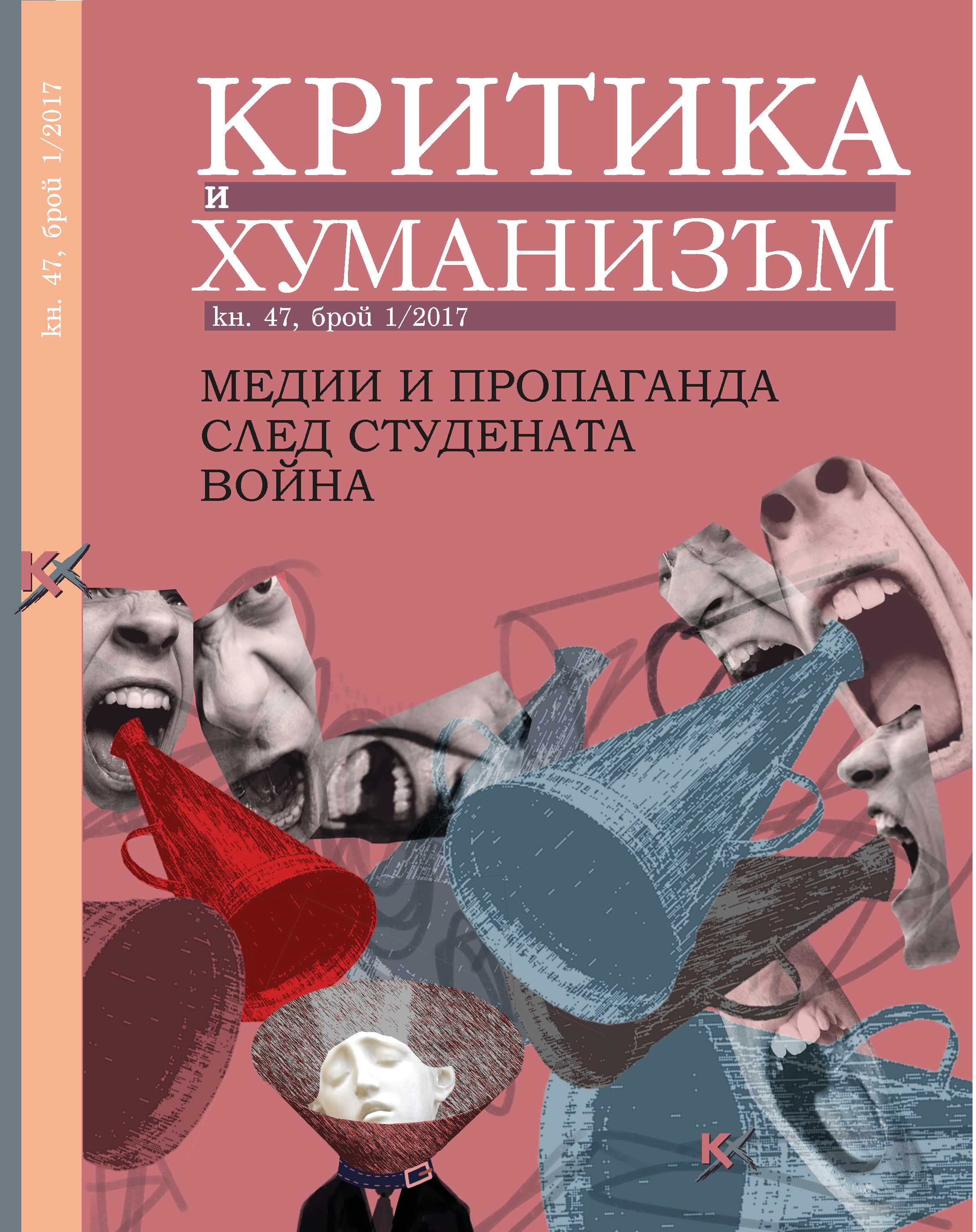Логика на пропагандата. Първа част. Популизъм и пропаганда: опасни връзки и семейни прилики
Logics of Propaganda. First Part. Populism and Propaganda: Dangerous Liaisons and Family Resemblances
Author(s): Dimitar VatsovSubject(s): Politics, Philosophy, Political Philosophy, Political Theory, Civil Society, Security and defense, Politics and society
Published by: Фондация за хуманитарни и социални изследвания - София
Keywords: Propaganda; logics; grammar; clichés; metonymy; modalisation; generalization; empty signifiers; propaganda epithets
Summary/Abstract: On the basis of the empirical data from the collective study “Anti-DemocraticPropaganda in Bulgaria” and reframing a cluster of already existing post-Wittgensteinian theoretical approaches this text aims to outline the logics of propaganda on two levels: Its First Part has to describe some more general typological features of the propaganda usages of language (i.e. propaganda’s“general” practical logics) and its Second Part has to describe the particular conspiracy grammar and typical vocabulary of the recent populist, antiliberaland national-sovereigntist propaganda (from Putin through Orban to Trump), i.e. its specific practical logics. Here, in the First Part, in comparison with the scientific and everydaylife modes of speech, some more general features of the propaganda usages of language (common both for the commercial advertisement and for the politicalpropaganda) are outlined: - We can speak of propaganda if a strategic dissemination and repetition of stereotypified messages (clichés) is done; the strategic goal of such repetitive dissemination is to transform those clichés into meta-clichés: into a depth grammar that frames the articulations for a multitude of individuals. In this aspect propaganda resembles education but it also differs from scientifically informed education by other features: - Propaganda works in a regime of totalisation of the discourse, where the specific modalities of the separate messages lose their significance: the peculiar task of propaganda is to create an overgeneralized discursive horizon that enables the fusion of modalities and hence a free play of associations between messages. Being overgeneralized the propaganda discourses resemble the scientific discourses and differ from the everyday-life discourses; being freed from any strict sense (from any strict modalisation), propaganda differs from science and resembles the ordinary bullshitting (in Harry Frankfurt’s sense). Propaganda usually does not lie about the facts but it lies through modal extensions (or modal reductions) of the meanings of selected facts. - Propaganda works in a regime of metonymy: It deposits utterance overutterance in such a way that the modal differences between them disappear andinstead a metonymical chain appears: in the end it looks as if every utterance substitutes the other, as if they mean the same. This metonymical propagandaoperation is conditioned by the overgeneralized and fused discursive horizon but it also produces this very horizon: a circular productive relation takes place. Through metonymy propaganda simulates coherence but such coherence is alie because every modal concordance between the terms and the utterances is broken out in advance. Beyond the “general” logics of propaganda, another distinction has been made: between populist uses of language and propaganda uses that are parasitic in relation to populism and operate with the demarcation between “we, the people” and “they, the elites”. We agree with Ernesto Laclau and Chantal Mouffethat in the spontaneous populist movements “the people” comes into being as an empty signifier springing from metaphors and catachreses. The practical unfolding of the discourse however – with everyday-life metonymies from below or with strategic propaganda metonymies from above – inevitably fulfills the empty signifiers of populism with one or another specific meaning and transforms it into a half-empty signifier. It is a specific populist-propaganda operation to totalize such half-empty signifiers (as “the people” and “its enemies”) and to use them as propaganda epithets: as devices for discursive terror.
Journal: Критика и хуманизъм
- Issue Year: 2017
- Issue No: 47
- Page Range: 113-149
- Page Count: 37
- Language: Bulgarian
- Content File-PDF

